Guide for Food Safety Certifications
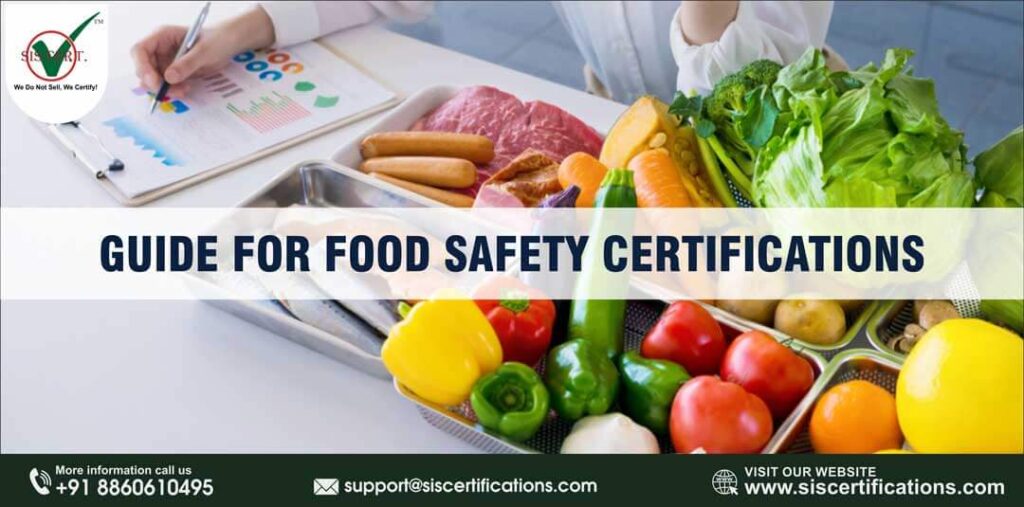
Food safety is crucial to protect customers from health risks. Access to safe and healthy food is a key to good health and happy living. It is necessary to know about the quality of the product before consuming it. We have Food Safety Certification ISO 22000 that validates the quality of the food products and ensures the safety and good health. Any industry associated with food either directly or indirectly needs this certification. What is ISO 22000? ISO 22000, also known as Food Safety Management System, provides a framework to implement and operate a food safety management system to provide safe and healthy food products to meet customer requirements. ISO 22000 certification applies to all food industries regardless of size and location. The Food Safety Management System standard complies with the HACCP principles. It concentrates on strategic decision-making for an organisation to enhance its food safety performance. It helps the organization to monitor, identify, prevent and improve food safety hazards. It strives to deliver safe and healthy products to meet customer requirements. Benefits of ISO 22000 Certification ⮯ It makes the organisation reliable and credible. ISO 22000 strives to meet customer requirements and deliver safe and healthy products, which expands the customer base. It helps an organisation to reduce its cost as it ensures food safety and quality products. ISO 22000 offers global recognition to the organisation because it is an internationally accredited certification that promotes transparency and accountability, strengthening the confidence of the customers. It requires strict compliance with food safety regulations. It helps the organisation to monitor, identify, prevent and improve any shortcomings and helps to optimize and update the system. ISO 22000 Food Safety Management System works on detecting and preventing approaches as it aims to identify potential risks and opportunities. It formulates strategies to mitigate the risk and reap the opportunities. Food Safety and Factory Audits⮯ Food safety audits help in ensuring transparency and assure that standards are being maintained. It focuses on the organisation’s operation, such as the food safety management system, food storage, sanitation, and hygiene. A food safety audit evaluates and documents the organisation’s food safety management and ensures that all the practices comply with the food safety laws and regulations. Importance of Food safety audit⮯ A food safety audit is crucial due to the following reasons: It is a transparent report. It is conducted to evaluate and verify the food safety system of an organisation. It aims at improving the food safety standards of an organisation. Focuses on strengthening the food control system An external or internal can conduct the audit. International food safety certifications ⮯ There is more than one food safety certification based on different food industries and ensuring the safety and quality of the products. These are: Good Manufacturing Practices (GMP) GMP is also known as Good Manufacturing Practices. It requires an organisation to manufacture quality products to eliminate contamination and the risk of errors. GMP standards require strict compliance with the laws and regulations, and failure to comply can lead to severe consequences. GMP requirements are flexible. The organisation can determine the best practices based on its needs. It is the minimum standard that medicine manufacturers meet in their production process. The European Medicine Agency (EMA) conducts frequent inspections to verify compliance with these standards. Hazard Analyses Critical Control Point (HACCP) HACCP, also known as Hazard Analyses Critical Control Point, is an internationally accredited certification. It prevents any physical, chemical, and microbiological contamination of food products at all levels of the food supply chain. It follows an evidence-based approach to demonstrate the organisation’s commitment to delivering safe and healthy food products. HACCP Certification is given to food processors and manufacturers to ensure that they have implemented the standards effectively. Halal Certification Halal Certification is a document that ensures the food products meet the requirements of the Muslim population. Halal word is taken from Quran, which means lawful, legal, or permissible. It guarantees the quality of food products based on the rules established by Islamic laws. It considers food safety and storage practices and provides access to the global market, where the halal certificate is mandatory. Food Safety System Certifications (FSSC 22000) FSSC 22000 is a Global Food Safety Initiative (GFSI), which provides a framework for food safety standards. It proposes a complete Certification for audit and food safety management system (FSMS). It also offers combined certification for Food Safety Management System (FSMS) and Quality Management System (QMS)- FSSC 22000-Quality. Tags
7 Benefits of ISO 27001 Certification
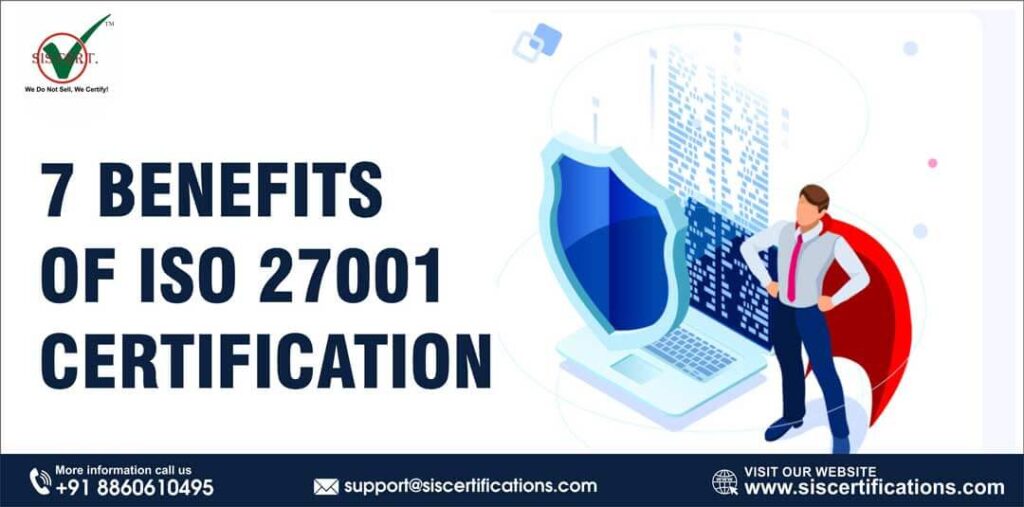
Digital transformation has provided new alternatives for organizations to manage records and information of the customers. It has also increased the chances of data breaches, data theft, and other cybercrimes. Data security is essential for public and private sector organisations as it is the responsibility of the company to protect their users and customer information and privacy. ISO 27001 provides a framework for organisations to safeguard data systematically and cost-effectively. ISO/IEC 27001:2013, also known as ISO 27001. ISO 27001 Certification is an internationally accredited certification for Information Security Management system. It helps organizations to address their information security and uses the best approach. It includes: Managing people Managing processes Managing technology It is published by the International Organisation for Standardisation (ISO), in association with the International Electrotechnical Commission (IEC). It focuses on risk mitigation associated with data security and privacy. It is designed to handle data security and provides a framework for an effective and efficient information security management system. It requires an effective ISMS. The ISO 27001 standard is not obligatory but makes the organisation more credible and trustworthy. It is not a legal requirement for any organisation as companies have to define their controls based on their needs. If the organisation is contractually obliged to safeguard customer data in that case, it is a legal requirement to have an ISO 27001 Certification. ISO framework integrated all the policies and procedures for an organisation to use. 7 Benefits of ISO 27001 Certification 7 key benefits of ISO 27001 implementation are as follows: Consumer satisfaction: Customers today are more aware and interested to learn how companies protect their valuable information. ISO 27001 exhibits the organisation’s commitment to upholding confidential information and privacy. It encourages annual internal audits to examine the performance and compliance with standards. It promotes robust security controls and enhances client relationships. Compliance with legal regulations: It shows the company’s obligation towards information safety and enforces information security regulations. It works to detect and prevent an approach to identify potential risks and reduces the risk of fraud, information loss, and disclosure of confidential data. It promotes compliance with legal, contractual and commercial regulations and makes the organisation reliable and credible. Increases business resilience: It concentrates on detecting potential risks and opportunities and enables the industry to deliver quality products and services consistently. It formulates strategies to mitigate the risk and reap the opportunities. Protects the reputation: It requires strict compliance with the legal regulations and shows the company’s obligation toward customer data and privacy. It enhances an organisation’s reputation and helps businesses win new partners and customers. Cost-effective: There is a provision for internal audits and management reviews to achieve desired outcomes. It suggests all the potential risks and provides time for the organisation to mitigate those thus, saves money. In countries like Europe and the United Kingdom, where GDPR is a legal requirement government can fine regarding non-compliance with data protection requirements. Improves the organisation’s structure: It promotes monitoring, maintaining, reviewing, and improving the security management system. It exhibits the company’s effectiveness in implementing an information security management system and reducing the need for regular customer audits. Provides a competitive edge: Every organisation has to define its security controls that depend on two factors. Needs of the organisation, and The requirements of the customers. Aligning your security controls with ISO 27001 controls provides the industry with a competitive edge in the market. It helps the organisation in many ways as ISO 27001 Certification related to Information Security Management System applies to most industries irrespective of their size, nature, and geographical locations. ISO 27001 is a versatile certification that can help the organization in many domains, such as Information Technology, Cybersecurity, Safety strategy, Data protection, GDPR, and many more. Implementation of ISO 27001 Implementing an ISO 27001- complaint ISMS can be a challenging task. ISO 27001 Information Security Management System implementation requires nine steps to follow. These are: Step 1: Assembling an implementation team Step 2: Developing an implementation plan Step 3: Initiating the Information Security Management System Step 4: Defining the scope of ISMS Step5: Identifying the organisation’s security baseline Step 6: Establishment of a risk management process Step 7: Implementation of a risk management strategy Step 8: Measuring, monitoring, and reviewing the working of ISMS Step 9: Certify Information Security Management System Advantages and Disadvantages of ISO 27001⮯ Advantages of ISO 27001:Following are the advantages of ISO 27001: It lowers the cost as it reduces the incidents of cybercrime and cyberattack. It improves business operations as it requires strict compliance with regulations. It makes the organisation reliable and credible. Disadvantages of ISO 27001:Following are the disadvantages of ISO 27001: Initially, the process can be a little expensive. It is less flexible as it requires strict compliance with the standard. Some organisations may resist it, considering the wastage of time and money during the implementation phase. ISO 27001 Benefits of lead auditor certification ⮯ ISO 27001 lead auditor certification offers training and expertise to conduct an ISMS audit. It provides guidance and knowledge of ISMS and its implementation techniques. It can help an individual to get hired smoothly and learn ISMS improvement techniques. Enjoy Reading – A Step by Step Guide to ISO 27001 Annex A Controls ISO 27001 प्रमाणन की तैयारी Why is ISO 27001 Important These Days Tags
Which QMS ISO Certification is for the Facility Management System ?
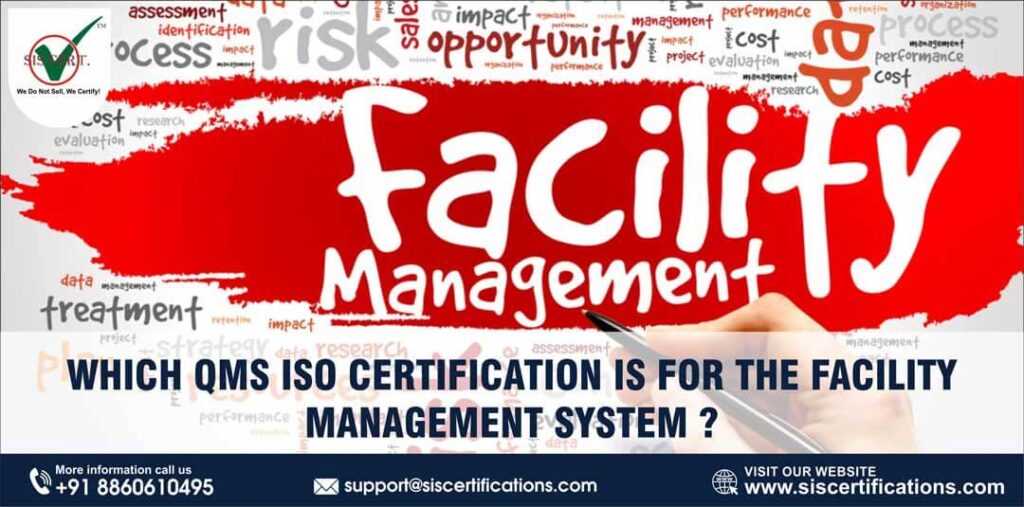
The QMS ISO Certification is 41001 for the Facility Management System ⮯ Quality management demands delivering and overseeing all the activities that must be performed to maintain a desired level of excellence. Every that surrounds us and makes things easy for us comes under the facility, such as safety, infrastructure and real estate. How can we decide which business is more reliable and effective in delivering the needed facilities? There is one ISO Certification that can give you all the necessary information regarding the facility management of an industry, which is ISO 41001 Facility Management System. Before understanding, what is ISO 41001 Facility Management System, we need to understand what is facility management ? Facility management is an organisational function which concentrates on delivering and integrating people, places and processes within the industry to improve the quality, productivity and efficiency of the organization. What is ISO 410001 Certification?:⮯ ISO 41001 Facility Management System, also known as FMS. ISO 41001 is an international standard published by the International Organisation for Standardisation for effectively executing facility management system in an organisation.The Framework of this certification is the same as the ISO 9001. ISO 14001 and ISO 45001. It integrates different entities within the business to make the management system easier.It exhibits efficient and adequate delivery of facility management that satisfies the needs of the demanding industry. It applies to organisations of any size and sector regardless of their nature and geographical location, that want leverage in the industry.It is a hallmark of trust that ensures the quality and efficiency of the organisation. It aims to meet customer requirements and the necessities of the interested entities. Benefits of ISO 41001 Certification? ⮯ It helps in improving workers’ safety, well-being and security. Getting ISO 41001 certified ensures that the organisation complies with all the legal requirements. We all know that the better the working environment higher the productivity. Providing a safe and quality working environment is one of the top priority. It improves the productivity and efficiency of the organisation, and it gives priority to the working conditions of the employees. ISO 41001 Certification enhances the strategic planning to meet customer requirements and promotes tactical operations. It provides you with an edge over your competitors as it is a piece of evidence that your organisation has effective facility management. It guarantees the quality of services that your industry offers. It focuses on customer satisfaction and aims to deliver quality services to fulfil the needs and requirements of the demanding entities. It is a hallmark of trust and quality that your services are top-notch and exhibit services consistencies. ISO 41001 is a legal requirement that encourages sustainability and environmental considerations. It is a hallmark of trust and quality that your services are top-notch and exhibit services consistencies. It offers you cost benefits and focuses on increasing productivity and reducing the cost of production. It promotes better use of the organisation’s resources and assets. It helps to increase profits and believes in providing high-quality services to meet customer requirements. ISO 41001 helps your organisation to focus more on revenue-generating practices, in turn, increases the profit margins. ISO 9001 vs ISO 41001, Which one is the best? ⮯ ISO 9001 promotes a quality Management System that ensures high-quality products and services to meet customer requirements, whereas ISO 41001 encourages a Facility Management System and provides a framework to deliver and maintain adequate facilities. ISO 41001 includes ISO 9001 as ISO 9001 makes ISO 41001 more credible and reliable. Requirements of ISO 41001 ⮯ It is an internationally accredited standard that shows the adequate application of the facility management system within the organisation by fulfilling specific requirements. It is not a sector-specific certification and applies to all organisations regardless of their size, type and nature. Get ISO 41001 Certification Process⮯ The ISO 41001 Certification process involves some technical process that needs to be followed. An industry has to develop its Facility Management system and needs to conduct a gap analysis. The organisation needs to provide training and guidance regarding the objectives of the FMS to the employees. An internal audit is done by the consultant while an external audit is done by the certifying body. Then they disclose their observation, and if everything goes rig SIS Certifications ISO 41001 certificate will be valid for three years. ht, they issue a Certificate. SIS Certifications is the ISO 41001 certification provider, and the SIS Certifications ISO 41001 certificate will be valid for three years. The last step is the Conduction of the annual supervision audit. What is the Cost of ISO 41001 Certification?⮯ ISO 41001 is globally known to provide a framework for a facility management system, and ISO 41001 Certification cost depends on your service provider as well as your business. It depends on the size of your organisation and includes two types of costs. Consultancy Costing Certification Costing How can you check the Validity of your 41001 Certification? ⮯ You can check the Validity of the ISO 41001 Certification using these options: You can go to the IAF website and review there, You can inspect on Regional register online, You can also check through the website of the ISO Certification body. Tags
What are the Legal Requirements for ISO 14001 Certification?
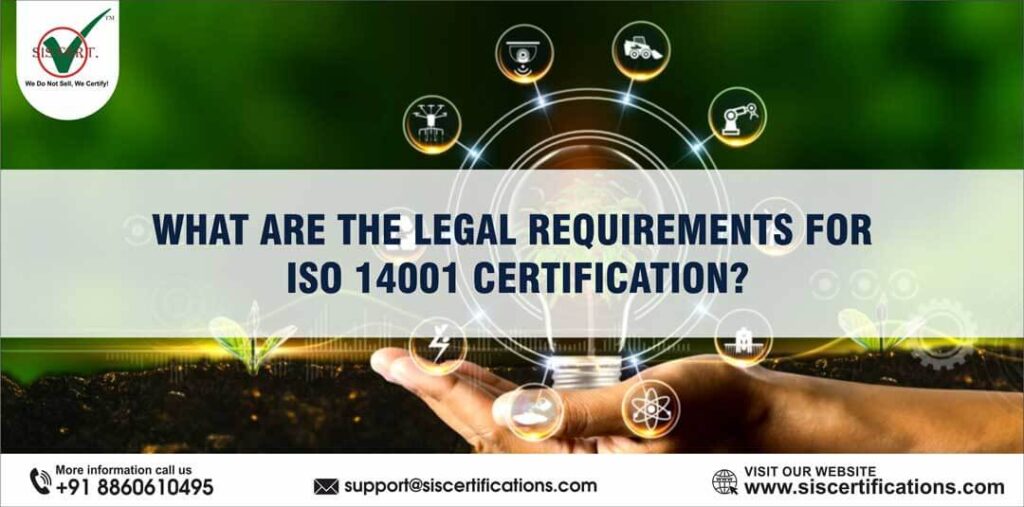
The legal requirements for ISO 14001 certification are as ⮯ ISO 14001, also known as (EMS) Environmental Management System. It sets the criteria and framework for an effective environmental management system. ISO 14001 Environmental Management System. It is an internationally recognised standard that helps to improve environmental performance through using resources efficiently and reducing wastage. ISO 14001 offers a lead auditor training program that aims to deliver the required expertise to conduct an Environment Management System (EMS) audit. It provides you with all the major auditing principles, techniques, and procedures. The latest version of ISO 14001, also known as ISO 14001:2015, was released in September 2015. ISO 14001 latest version has brought significant changes in the structure of the Environment Management system (EMS). It focuses more on standards and facilitates integration with other ISO standards. It provides a competitive advantage and helps to gain the trust of the entities. ISO 14001 Certifications requirements checklist – Suitable environment policy Specifying environmental objectives and targets Determining an organisation’s environmental effects Transmission of policies and objectives within the organisation and management Designation of stakeholders for environment management system Provision of environmental adherence Strategy to observe and estimate the progress Environment management system performance audit Ceaseless improvement The organisation should maintain and follow the procedures that are part of the organisation’s environmental objectives. Legal requirements are regulations related to local, national and international laws. ISO 14001 a legal requirement, as well as an own voluntary environmental obligation. Let’s have a look at all the legal requirements for ISO 14001. Legal requirements of ISO 14001 Certification ⮯ ISO 14001 Environmental Management System designs the critical requirements to enforce an effective Environmental Management System. These requirements are divided into ten different sections (Section 1 to Section 10) and work on Plan-Do-Check-Act (PDCA) approach. It is necessary to understand all the sections. Section 1 to Section 6 is in the Plan stage.Section 7 and Section 8 are in the Do stage.Section 9 is in the Check stage.Section 10 is in the Act stage. Section 1: Scope ⮯ It marks the Scope of the Environmental management system. It should meet the organisation’s environmental policies and strives to improve the industry’s environmental performance. Section 2: Normative references ⮯ In ISO 14001, there is no normative clause. Section 3: Terms and Definitions ⮯ This clause explains all the terms and definitions related to these four categories: Organisation and leadership Planning Support and Operation Performance evaluation and Improvement Section 4: Context of the organisation ⮯ It deals with identifying all the factors that affect the industry and understanding the requirements of the business. These aspects broadly depend on the size and nature of the organisation. This clause aims to find internal and external factors that affect the industry and enforce best practices for an effective environmental management system. Section 5: Leadership ⮯ It deals with allocating the roles and responsibilities within the organisation for an adequate environmental management system. It illustrates the importance of top-level management in executing and improving EMS. Section 6: Planning ⮯ It focuses on examining any risk and opportunity that can impact the industry and formulates strategies to mitigate the risk and reap opportunities. It also analyses the industry’s interaction with the environment and compliance with legal obligations to establish an effective Environmental management system. Section 7: Support ⮯ It addresses the needs and requirements of the management for an effective Environmental system. It promotes the flow of information, documentation and policies to ensure all the employees are well aware of the organisation’s objectives. Section 8: Operation ⮯ This Section is related to Section 6 (Planning), which states that the organisation should evaluate all the activities hindering the organisation’s manufacturing and services. The organisation must formulate policies to meet the operational requirement for environmental control and deal with a potential emergency. Section 9: Performance evaluation⮯ It is crucial to ensure that the organisation’s environmental management system is adequate and efficient. It involves monitoring and measuring the organisation’s current practices and identifying the areas for advancement. Section 10: improvement⮯ It ensures the effectiveness of the environmental management system and commits to enhancing required process areas to establish an environmental management system. Benefits of ISO 14001⮯ Getting ISO 14001 certified ensures that the organisation complies with all the legal regulations. It demonstrates that the organisation is concerned about the environment and builds trust in the customers. ISO environmental certification helps to provide a competitive advantage to the organisation as it displays that you have an active commitment to the environment. It reduces the amount of waste generated by the industries as one of the requirements of ISO 14001 is that the organisation needs to demonstrate that it complies and works to achieve the environmental objectives. How to check the validity of ISO 14001 ⮯ To check the validity of your certificate you can go to the IAF website and search using your business name. You can also check the validity from the local Accreditation authority website You can also use the Certification body website to check the validity of your ISO Certificate. Tags
What is ISO 9001 Certification?
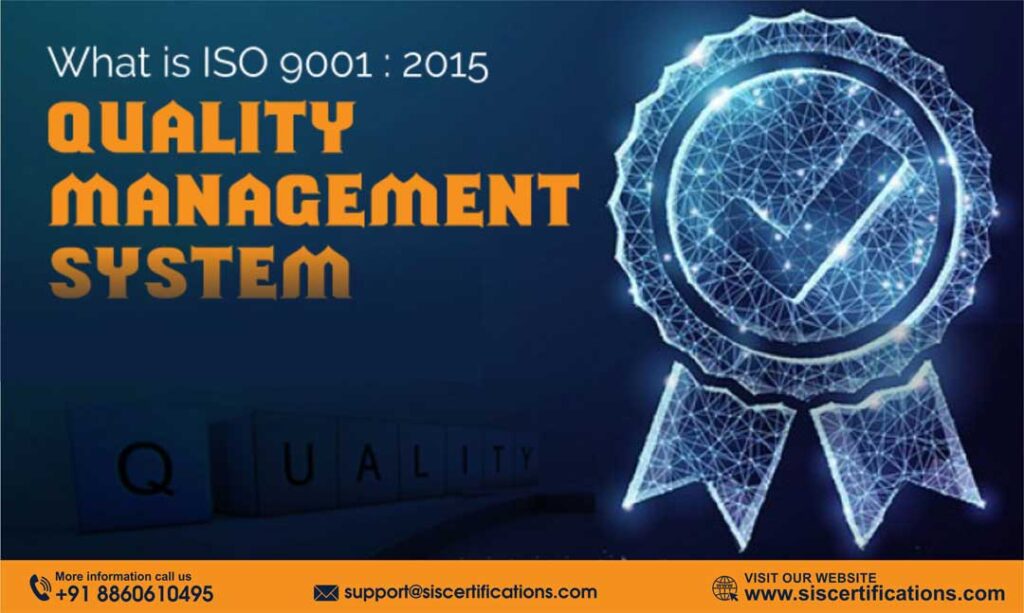
The legal requirements for ISO 14001 certification are as ⮯ An ISO Certification is documentation that the industry runs on the international standards defined by ISO (International organisation for standardisation). There are more than 22000 types of ISO Certifications covering almost every industry. However, some are pertinent to most trades, such as ISO 9001. What is ISO 9001? ISO 9001, also known as the Quality Management System (QMS), is one of the most generic ISO standards. It promotes the manufacture of good quality products and services, as it strives to deliver the same to its customers. It concentrates on creating the same quality products to meet customers’ expectations. Any industry can apply for ISO 9001 Certification regardless of its size, as it applies to most industries. It follows PDCA (Plan-Do-Check-Act) technique and process approach to demonstrate the ability to fulfil customers’ expectations. It operates on seven pillars to offer the same level of satisfaction to the customer. These pillars are: Customer focus Leadership Engagement of people Process approach Improvement Evidence-based decision making Relationship management How much does ISO 9001 Certification Cost ? ⮯ The cost of ISO 9001 Certification varies from one organisation to another, which depends on the agency. The prices are determined only after auditing the business, as it depends on the number of branches an organisation has and the number of employees in the firm. The ISO 9001 Certification keeps on revising, and the current version of ISO 9001 was released in September 2015, also known as ISO 9001:2015. How is ISO 9001:2015 different from ISO 9001?⮯ ISO 9001:2015 is not a new standard. It is a revised form of ISO 9001. ISO frequently reviews all the standards to remain up to date. The main objective of the revision is to improve the quality, efficiency and process. ISO 9001:2015 standard, also known as Quality Management System (QMS), aims at delivering good quality products and services to meet customer requirements. It is an integrated standard, which encompasses all the processes, resources and values. The revision includes instigating new techniques and information and restructuring the principles to cater to the demand of the customers’. It is more flexible, as it provides leverage to companies to define their objectives. What are ISO 9001:2015 requirements? ⮯ It specifies the requirement for the Quality Management System in the enterprise. The changes in ISO 9001:2015 are generic, as they are functional to any industry irrespective of the size. It requires industries to have: – Context of the organization: An organisation has to determine the internal and external factors that affect the quality of the services. Leadership: Establish all the objectives and the qualities for an effective and efficient management system. Planning: Do proper planning to reduce undesirable results and achieve your targets. Support: Provide an effective environment for your employees to increase their efficiency. Operation: It requires effective monitoring, inspection or testing to ensure the quality of goods and services. Performance Evaluation: Find out the areas which are causing undesired results. Improvement: Focus on all the aspects which need improvement and work on them, such as meeting customer needs. Is ISO Certification for individuals? ⮯ No! an individual cannot become ISO Certified. But, one can become a Lead Auditor after completing ISO 9001:2015 QMS Lead Auditor training program. Tags
Why is ISO 9001 Certification beneficial for IT companies?
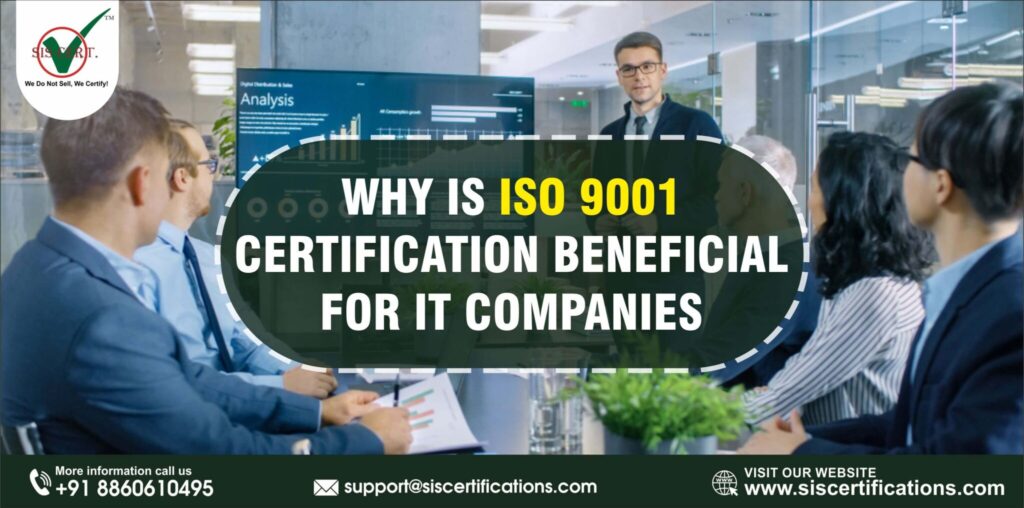
ISO 9001 characterizes the necessitate the quality management system in an organization, which design, manufacture, and deliver the product and services to attain the customer legislative and regulatory essentials. The standard also reassures to specify a framework that accesses the customer perception and his improvements. ISO 9001 certification consequences a satisfactory management practice. The certification influences a global standard that spells out quality and belief. To contact ISO certification, an organization illustrate its capability to consistently contribute products that absolutely matches with customers’ statuary & regulatory requirement and pursue the expectations of customers. The advantage beyond ISO 9001 certification eases international trade by providing standards that are recognized and respected globally. There is a general standard that is applied to all sectors. Some of the sectors are processing, serving, printing, electronics, manufacturing, computing, legal services, banking, and so on. The quality management system develops products and services enhances efficiency and helps in reducing costs. Benefits of ISO 9001:2015 Certification Services A proficiently designed and implemented quality management system, based on ISO 9001:2015 certification services that furnish the numerous benefits in an IT company. The advantage the IT companies becoming ISO certified will help the organization’s staff to improve their services and customer loyalty. ISO 9001 is remarkable in nourishment fabricating because of its hazard-based control measure from the QMS. having a QMS permits you to food safety norms and holds a greater level of value in the industry. ISO 9001 certifications imply that you have a functional administrative process to set the screening strategy. Addressing threats and opportunities associated with its context and objectives. strong involvement and commitment from top management. Accelerate opportunities to enhance customer satisfaction. Help in establishing a framework for performance improvement. A stronger understanding of customer expectations. Enhanced level of employee awareness. Advances the service’s reliability. It will help the organization in record keeping. Enhanced customer morale. Serves factual approach for taking decisions. Upgrade continuously ISO 9001:2015 certification services provide technology companies the guidance for the required system and the practices to achieve the process efficiently, and effectively. Quality management standards look ahead to improving the standards for customers. Small-scale technology businesses can struggle to attain a high-level effective process, however, adopting the ISO 9001 certification can make it achievable to be on the top of the competitive organizations. The instantly growing business in technologies and communication providers noticed a significant rise in customer satisfaction levels by adopting ISO 9001 to help them to enhance their order completion rates. ISO 9001:2015 certification services can issue much supremacy to organizations with a well-implemented quality management system. ISO 9001:2015 brought some changes and requires to aware some changes from this version. This certificate may provide constant services with enhanced customer contentment and address the risk with the awareness of customer changing expectations. The new form acts for increasing complexity and the organization should focus on the needs of services providers. The current structure of an organization creates better management regarding ISO 9001 and other standards. This quality standard certification maintains customer satisfaction and reliable services on higher preferable. It focused on the inspiration of the senior manager and the overall process they accept to implement continual improvement policies. By applying ISO 9001:2015 certification services, the organization provides high-quality products and services. This process ensures the organization may become more efficient, reducing threats and maintaining a high level of standards. And this will help you to observe numerous regulatory requirements and be beneficial for your brand that will serve your customer’s satisfaction that they will expect and desire from the product. Tags
Why Food Safety Certification is Important in Poland ?

Nowadays health, hygiene and regulations are the one of the most important concerns of every individual because everyone wants to stay healthier and fit. To fulfil all the needs of the people, the food management systems are certified through various international certification bodies. The food safety standard focuses and addresses main requirements like safety, quality, legality and integrity of the food products. Mainly food safety certification is the third party verification. In this verification the third party verifies the product and system in the food supply chain and they will verify whether the implemented system will meet the standards of the food safety standards as per Polish Norms. This verification is different from the other systems conformity. The food industry is one of the industries that need to be very conscious about the safety and quality of the food because they have to meet up the needs of the people, so that their health should not be affected. In the food safety certification attests that the food product complies with the safety, and other predefined standards of the food management system. The food organisation can be certified according to the standards and the food safety certification. These standards give a kind of confidence in the organisation that the organisation has obeyed the food management system with all the products, services, activities, processes and Food Safety Standards as per Polish Norms. All the food organisations can be certified by a food safety certification according to its size. An organisation has to exhibit its ability to control and meet all the peril related to food safety. So that they can make safe food at the time of human consumption. The food management system sets some factors and accordingly they give the food safety certifications to the food organisation. Factors comes under the food safety certification: Proper cleansing and sanitisation of the equipment, utensils and area . Personal Hygiene Usage of safe water and raw material. Prevention from contamination of the food Storage, preparation and cooking food in the correct manner in the right temperature, environment and equipment. Understanding of the food combinations and food allergies. Understand how to keep the customers safe from food poisoning and bacteria. Effective pest control measures. Popular Food safety certifications in Poland with norms and other countries. BRC – British Retail Consortium HACCP – Hazards Analysis and Critical Control Points FSSC 22000 – Food Safety Certification IFS – International Food Standard ISO 22000 – Food Safety Management System Now the questions arise why some businesses or organisations go for the food safety certification. Food safety certificates give assurance to the customers that some particular organisation’s products meet the requirements of the national and international standards of the food management. This certificate will be beneficial for the food businesses because they have a competitive market. Benefits of Food Safety Certification in Poland ⮯ Food safety standard is one of the common requirements for those who want to do the food business. If you are fully certified then you will enjoy the following benefits : Properly food safety certified organisation will consistently produce safe, healthier and Quality food products that will meet all the customers expectations. A fully certified organisation will easily demonstrate all the processes when the management is meeting with its legal responsibilities related to food safety and regulation. An organised organization has employees aware of all the food safety measures and concern before it become larger problem. A certificated organisation aware of the legal requirement of the particular country and origin. A certified organisation works in the world market by reducing the barriers to international trade. After the certification the customer will get confidence in the organisation and its products. Products of the certified organisation are accepted globally. Barriers for the Food Organisations to get the Food Safety Standards in Poland as per Norms ⮯ Barriers for the food organisations to get the Food Safety Certifications in Poland as per their Norms : Financial Problem Inexperienced employees Time consuming to find a suitable certification body Require Huge funding No Knowledge is required for implementing quality and safety system Lack of awareness regarding food safety certification Advance training required Difficult for small organisations Tags
What is Quality and Its Importance for all Business?
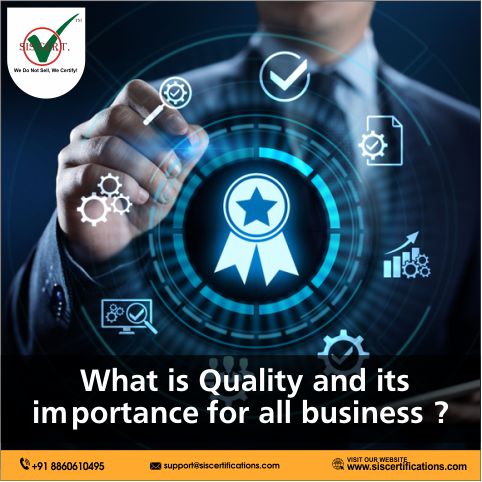
To ensure the success of your company, quality must be maintained at all levels. Each product, service, process, task, activity or decision within an organization can be judged on the basis of quality. How good is it, how great is it, and how can we improve it? Quality management is critical to the growth and performance of a business. It is also a key resource in competing for client relations, striving to deliver a superior experience. Businesses can implement a set of procedures to ensure that their products meet the standards and operate at their best. The ultimate aim is to improve customer satisfaction and boost business growth. Quality is not limited to the final product, it concerns all the processes, systems and people behind this outcome. It is always the pursuit of excellence ensuring that what your organization does is appropriate for the purpose, and not only remains that way, but continues to improve and outstrip competitors. Why does your Company need to be Concerned about the Quality? ⮯ Companies should do everything in their power to support their competitors. Providing high-quality products and services is of the utmost importance. Quality Management System QMS is right, as it helps businesses maximize the costs and use of available resources. In the long run, these practices reinforce the brand of your business, bringing you up to the level of your competitors. Because they enhance your outcomes and commercial operations, they strengthen your market position. Good management can improve the brand and reputation of the organization, protect it from risk, increase its efficiency, increase its profits and reduce waste, and position it for continued growth. While making staff and guests happier. Higher Profitability Studies demonstrate a strong positive relationship between quality and profitability. In fact, high-quality results in a higher return on investment (ROI) for a specific market share. Fewer faults or failures in the field translate into lower manufacturing and service costs; As long as these earnings exceed any increase in the company’s default prevention expenditure, profitability will improve. Improving performance, characteristics, or other dimensions of standards translates into increased sales and market share. More Coherent Products and Improved Efficiency ⮯ Effective management enables businesses to improve the reliability, sustainability, and performance of their products. This helps differentiate an enterprise from its competitors. Better products are equivalent to happier customers and higher incomes. Customers who purchase products from your company will expect the same standard whenever they purchase. Without an adequate management system, your customers may end up buying the same result, but with various standards. Check all items prior to distribution to the consumer or selling them will give you peace of mind that the same high level is maintained throughout the business. Greater Satisfaction of the Clientele ⮯ In the current competitive environment, consumers are tougher than ever. They can choose among thousands of brands and have access to millions of stores thanks to technological advancements. If the products and services don’t live up to customers’ expectations, your brand and your business will suffer. Clients want assurance that their hard-earned money is being spent on something which is worth the price and not something of a bad standard, least of all defective. Good management ensures that the products of the business exceed customer expectations. It can help make sure your prospects are loyal customers. It does this by constantly improving your products, integrating changes, and eliminating defects. If you want your company to stand out, it is essential to meet or exceed their expectations and meet the highest standards. In return, customer satisfaction contributes to customer loyalty. If a client is satisfied with a business outcome, they will return to the business for other products. However, if they receive a faulty product, they are more likely not to return to this specific brand! Who is Responsible for Quality Management? ⮯ Quality control should be the responsibility of every member of the organization. Different people will be responsible or influential for the different things that affect quality, specifically the requirements, compliance with them or determining the quality of a product. It is also important to have individuals who can provide the knowledge, tools and advice to help everyone play their role in achieving quality. These people are top-notch professionals, which is a career that many employers demand. Professionals are committed to protecting and strengthening their organizations by ensuring that the needs of stakeholders are met and hopefully their expectations will be exceeded. SIS certificates offer a training course for the implementation of management systems that have been designed to equip professionals in management and quality with the knowledge and skills needed for implementation, review and manage the world-renowned ISO standard. For more information about ISO Certifications, contact us: email or you can visit our website for more details ! Tags
Learn more about ISO Registration
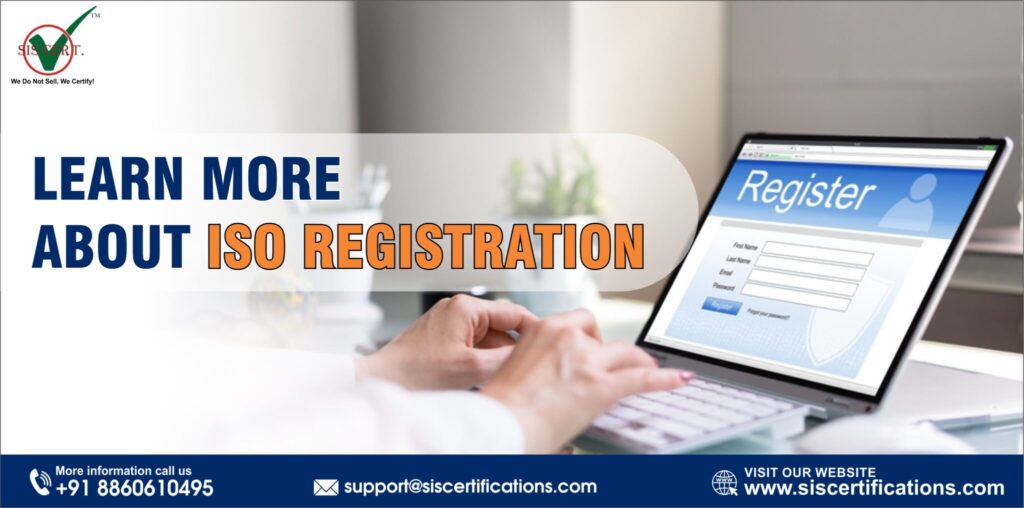
The International Organization for Standardization (ISO) aims to advance enterprise and product standardization by facilitating innovation for further improvement. This certification may frustrate many business owners, but it is straightforward and easy to obtain. Here, you will learn the procedure for obtaining the ISO 9001. ISO facilitates innovation and sets the stage for trade development. The aim of achieving an International Organization for Standardization registration (ISO) is to advance the standardization of technology and the improvement of the use of technology. ISO certification can seem like a nightmare, but it’s a lot easier and more direct than we all think in general. But almost none of us know what procedures have to be followed for ISO certification. Therefore, to facilitate the registration process, here are a few helpful tips that we are talking about here. Significant aspects of ISO registration. Select the appropriate Standard ⮯ There are certain standards that depend on each industry. Therefore, the first step is to determine what framework will be appropriate for the organisation in order to achieve the organisation’s goals and objectives. Some of the important standards are: ISO 9001 – refers to meeting customer requirements, improving customer satisfaction and organizational quality can be documented through ISO 9001 certification. It is very important to find an ISO registrar, and the ANSI-ASQ National Accreditation Council (ANAB) can be used to select the registrar. The Registrar must meet the requirement of ISO accreditation bodies, which include independence. The person cannot consult, for example, for consistency in the registration process to be achieved. Selection of an ISO Registrar The Registrar should be chosen in the area of experience required by the industry in question. While the search for registrars, some of them might be with a very limited reach in this area, so potential registrars should be zeroed out. Some people may be good in every sector, while others may be good in a particular area. Therefore, the best way to identify is by contacting the registrars we choose so that they will also benefit from negotiating the price. Development of an ISO Application and Review of Quality Documents ⮯ Once the Registrar has completed the organisational analysis on auditor interpersonal skills, etc. then the organisation must agree on the implementation agreement between the company and the registrar. This is a very important step in the ISO registration process because it defines the rights and obligations of parties that understand issues of liability, confidentiality and access rights. The Registrar will require a copy of the document to ensure that all standards have been processed. Considerations in Planning ⮯ While the registration process takes a long time, it depends on how we set the dates which is suitable for both the company and the Registrar to prepare fully. Every document review and screening requires about two to four weeks. To ensure that the system is maintained correctly and that no changes result in system failures, registrars must be monitored on a regular basis. Strong Return ⮯ It is important that everything that is done is beneficial and the registration and verification process should bring more value to the company, thus improving the system. ISO registration adds value It gives formal recognition of how the business is managed and the intention to enhance the business will attract investors. It helps reduce waste and costs, which in turn, is beneficial for the organization. It gives greater opportunities. The most important thing is that ISO registration gives market recognition to companies. It is an efficient, regularly audited quality management system that generates a larger number of professionals. Quality Management ⮯ ISO certification requires the active participation of senior management and sufficient dedicated resources. Consequently, registration under ISO will provide standards to be met. International frameworks allow clients to feel confident that their product is safe, reliable and of a good quality which will increase the benefit of the organisation and in turn help the company to get loyal customers. Therefore, registration under ISO benefits both the organisation and customers. Original standards took into account weights and measurements, but now they have become a family of standards that cover everything from shoes to Wi-Fi networks. Regulators and governments rely on ISO standards to help develop better regulations that include air, soil, spectacle and radiation regulations, and all aspects of the environment. Consequently, if ISO 9001 registration is made mandatory, many violations will be stopped. If ISO registration is carried out, numerous risks will be avoided in industries and organisations. That is why, to sum up, ISO registrations must be made mandatory for the company and the company to benefit from them. While the ISO standard is available for almost every industry, it varies from industry to industry. Remember, in order to obtain this framework, you should focus on innovation, customer satisfaction, and more. And don’t forget that ISO registration will add more value to your business. Tags
ISO Certification can Boost your Business; Here’s the Way
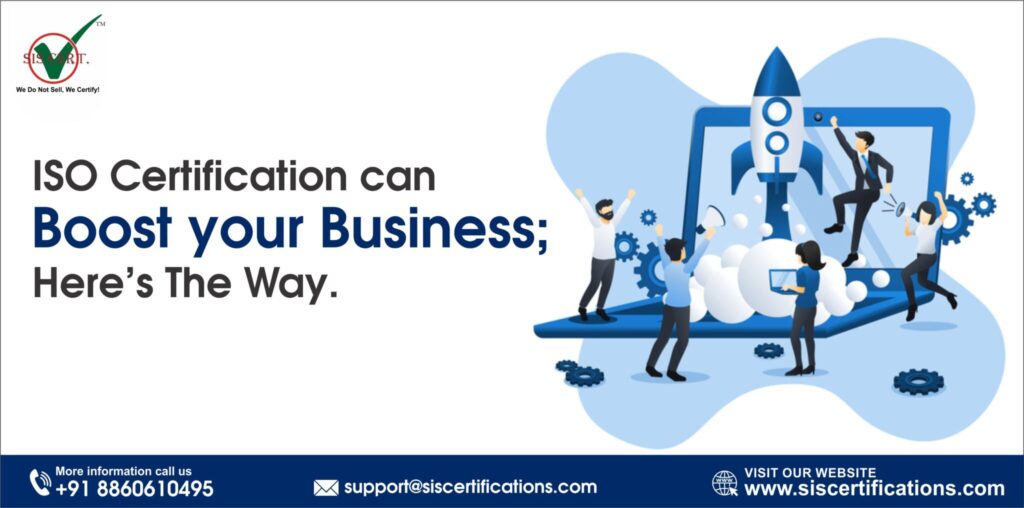
If you own a business, you must make sure that you have legally verified the quality of the products and services. This has two reasons: Public trust Safety of your team No matter what your company is, you can get an ISO certification to prove that your company is operating to a good standard. What is the importance of ISO? ⮯ The International Organization for Standardization (ISO) is an independent organization that sets standards to be followed by organizations. Standards refer to the quality, safety and effectiveness of products or services provided by companies. The ISO 9001 certificate, in particular, represents the high quality of goods and services. So, when you are stuck by competition or the struggle to stand out in the marketplace, it can help you maintain, nurture and strengthen your confidence in the marketplace. The ISO certificate enhances the credibility and authority of the company, as well as the overall effectiveness of the company. If registering your business for an ISO management system on your own sounds too complicated, then contact us. In addition, our team of experts in SIS Certifications will guide you through it and manage most of the process on their own. What makes ISO certification vital? ⮯ ISO certification has several benefits in India. That includes the following: High Credibility ISO has an international reputation. Consequently, it makes the product more reliable and customers will know that you are a business they can trust. High Recognition Thanks to an ISO certificate, the brand will become world-renowned. Moreover, it will increase the status of the brand among competitors and the audience as well. Improved Consistency ISO certification helps increase control of business processes. The more control you have, the more consistent you are. In addition, increased consistency means customers receive the same good service or products every time they do business with you. Enhanced Revenues When there is quality assurance, people will get back to you over and over. When it is ISO certified, you can better assess the product/service and expect better returns for your company. A classic Government Label ISO certificates make it easier to market your high-quality products. You can apply an ISO label to the product while it is being packaged and documented. The ISO symbol tells a great story about quality for you Better Customer Retention ISO standard guarantees quality for your products. When that happens, clients know what to expect from you and familiarize themselves with products/services. This leads to customer fulfilment and loyalty. Preconditions for achieving ISO certification in India. Select the appropriate ISO certification type Several ISO certificates are issued based on business and activities. The first step is to decide which ISO standard applies to the company. Select an ISO certification body that is credible ISO has entrusted the issuance of certificates to external organisations. You must make sure that the organization you select is credible and recognized by ISO for the issuance of certificates. That requires research on your side. Please take the following into consideration during an audit: ⮯ Evaluate files from different ISO bodies. Check if they comply with CASCO standards (this is a committee created by ISO to oversee compliance assessment issues) In addition, verify that they meet the requirements of the ISO accreditation bodies. Once you have selected the right body, the certificate application process starts. Moreover, it is a lengthy process that can take up to 6 months to be completed. If your organization does not have the capacity to perform these tasks, you may contact SIS Certifications. Our experts will help you choose the correct ISO certification and put you in touch with a trusted organisation. We will also help you achieve your certification as ISO/IEC 27001 certification for your business. Tags
